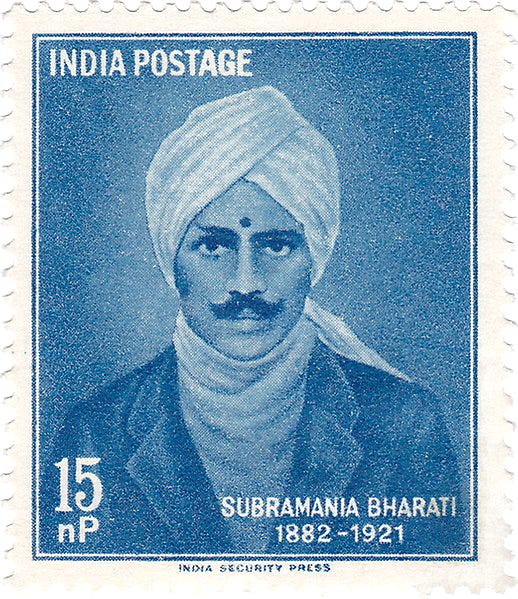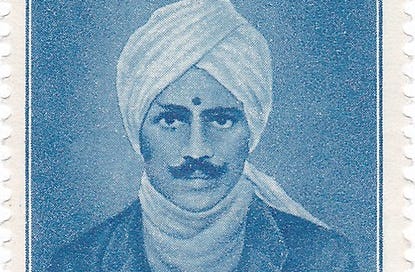Subramaniya Bharathi, modern Tamil’s greatest poet, is also one of the giants of Indian literature. His contribution to modern Tamil poetry is unparalleled, and his influence far-reaching. Upon the occasion of Tamil New Year, we bring you an introduction to the poet, his works, and his life and times. This piece has been graciously contributed to Eaten by a Fish by Vijay Santhanam, friend, author, and staunch supporter of this newsletter. Many thanks to him for this article.
C. Subramaniyan was born in Ettayapuram, Tamil Nadu on December 11, 1882. When he was eleven, owing to his excellence in poetry, the king of Ettayapuram conferred upon him the title of ‘Bharathi’, one blessed by Saraswati, the goddess of education, literature, and music. Over time, his stature as a poet grew manifold and he became known as ‘Mahakavi’ Bharathi, or ‘the great poet’ Bharathi.

BHARATHI AND THE TAMIL LITERATURE TRINITY
Tamil scholars and students alike consider Kamban, Valluvan and Ilango the three greatest writers of Tamil literature. Kamban was honoured by the Chola king with the title of ‘Kavi Chakravarthy’, ‘the emperor of poets’. His literary works include the Tamil version of the Ramayan. Valluvan was a great poet and philosopher. His most famous work is the Thirukural, 1330 couplets on the three subjects of virtue, wealth, and love and sex. Ilango was a monk and a poet. It is believed that he was a brother of the great Chera king, Senguttuvan. Ilango wrote the Silappathikaram, the most famous of the five great Tamil epics. In a poem he wrote glorifying Tamil Nadu, Bharathi praises it as ‘the land of Kamban, Valluvan and Silappathikaram’.
The three great poets lived and wrote many centuries ago. Bharathi, though a much later poet, deserves, in my view, a place on the same pedestal, if not a higher one, than them. And this is why I think so:
Bharati wrote in a language that was simple, yet beautiful, and which the common people could understand and admire.
He had an excellent musical sense. As a result, he wrote many lyrical poems too, which are meant to be sung, and Bharathi himself suggested the ‘raagam’, the melodic scheme, and ‘thaalam’, the rhythm, for these songs. Many of his famous lyrics have become Tamil movie songs.
He was much more than a poet. He was a polyglot, a patriot who participated in India’s freedom struggle, a journalist, a social reformer and overall, a man far ahead of his time.
In this article, I will try to give a few glimpses of the great man and his work.
Bharathi did not live to celebrate his thirty-ninth birthday. Yet, he was so prolific that it is impossible to do justice here to all the many types of poems and songs he wrote. I have therefore decided to focus on three areas, which I think are the most important. I have therefore reluctantly had to give a miss to his devotional songs (except the Kannan poems), the Kuyil (cuckoo) songs, and inspirational poems such as No fear, no fear, no fear at all.
All translations in this article are mine. However, I have not translated Bharathi’s Tamil lines and verses word for word, or line by line. Instead, I have chosen to adopt a style that makes it easier for the non-Tamil speaker to understand not only the content, but also to appreciate the spirit and intent of his words.
A PROUD TAMILIAN, A PATRIOTIC INDIAN, AND A GLOBAL CITIZEN
Though Bharathi was proficient in many languages, edited an English newspaper and translated work from other languages including Sanskrit and Hindi, most of his literary work is in Tamil. His love for the language and for Tamil Nadu, is evident in poetry. In his famous poem Senthamizh Nadu, the first stanza itself is brimming with pride:
To hear the name of prosperous Tamil Nadu
Is like honey oozing into the ears—and when of
Our forefather’s land we talk
Energy and vigour are born in our breath
Bharathi was also deeply involved in the Indian nationalist movement. He attended the All India Congress sessions in Varanasi, Calcutta and Surat. He befriended V.O. Chidambaram Pillai, Lajpat Rai, Aurobindo and others; but he was most influenced by Bal Gangadhar Tilak. In 1907, Bharathi started editing the Tamil weekly India and the English newspaper Bala Bharatham. In 1908, the owner of India was arrested by the British in Madras. Fearing arrest, Bharathi moved to Pondicherry, then under French rule. For a decade, he lived there in exile, continuing his writing and editing journals. Most of his political articles were banned by the British in India. When he returned to British India in 1918, he was promptly arrested. Owing to his ill health, he was released from jail. Later, in 1919, he met Gandhi. He wrote odes to Tilak, Gandhi, Rai and other leaders.
Many of Bharathi poems are fiercely patriotic. They contain a variety of emotions including fury towards the British, sadness wondering when the thirst for freedom will be quenched, and frustration at his fellow Indians who, in his view, were afraid (of life and living), and believed in superstition and other evils. His version of Vandhe Matharam is inspiring, and several of his other poems reflect his pride in his motherland.
Bharathi strongly believed in the diversity of India. He admired the Sikhs so much that he started growing a beard and wearing a turban. In his famous song Sindhu Nadhi (‘Indus River’), he wrote:
On the bank of the Sindhu river with the moonlight shining
Women from the fine Chera* country
Are composing and singing in sweet Telugu
Let’s row our boats merrily
Let’s barter wheat harvested in the plains near the Ganga river
With betel leaves grown in areas in the Cauvery delta*present-day Kerala
A SOCIAL REFORMER
Bharathi was a true liberal. He was particularly passionate about social reform in two areas: empowerment of women and the fight against casteism.
He wrote several poems on women rights. A few lines of the poem Pudhumai Penn (‘New-age Woman’) will give a clear idea of his vision. Note that he wrote it over a century ago!
Understanding that man and woman are equal
Will make the world wiser and it would thriveHolding her head high, with a straight look
Fearless in her integrity as she walks on the earth
Confident of her intellect and wisdom
The new-age woman never feels inferior.
In his epic poem Panchali Sapatham (‘Panchali’s Vow), Bharathi retells the incident of the dice game from the Mahabharata. He tells of the invitation from the Kauravas to the Pandava prince Yudhishthira, the latter’s inability to resist and his gambling away his kingdom, his brothers, and even his wife, Panchali (Draupadi). In his poem, Draupadi is the heroine, Krishna the saviour. Years after he wrote Panchali Sapatham, Bharathi imagined Draupadi as Mother India and the British rulers of India as the Kauravas. He wanted not only the shackles of slavery under foreign rule to be broken, but the liberation of women as well.
On caste and casteism, Bharathi advised children:
Don’t believe in caste, my child
Talking of low and high castes is a sin
Justice, wisdom, education and love—
Those who possess these attributes, they are truly superior
And in another poem, he beautifully made his point against caste with a metaphor:
There was a white cat at my home
It gave birth to many kittens
An ash grey one, another black—yet others
Snake’s colour and milk white
Whichever the colour, aren’t they all equal?
The appearance and colour of humans isn’t important
It’s their thoughts and deeds that really matter!
Born a brahmin himself, Bharathi was strongly opposed to his brethren discriminating against other castes and looking down upon them, especially the Dalits. Once he even organised a function where he invited non-brahmins and conducted an initiation ceremony to let them wear the sacred thread and ‘converted’ them to brahmins.
BHARATHI’S KANNAN POEMS
Bharathi wrote many devotional poems and songs—on the goddess Parasakthi, the gods Murugan and Shiva, and even on Allah and Jesus. But the one God he had a special place in his heart for was Kannan (Krishna).
Usually, poems and songs in Tamil in praise of the gods are filled with worship, obedience and reverence. This is true of both Shaivite poets, such as ‘the three’, Appar, Sambandar and Sundarar, and Vaishnav poets like the Alvars. Common people address their gods with the honorific ‘you’—’ninikal’ in Tamil, equivalent to ‘aap’ in Hindi. Bharathi was different. He often addressed Kannan without honorifics, as ‘ni’ in Tamil (equivalent to ‘tum’ in Hindi). On rare occasions, he even addressed Kannan as ‘da’ (the level of tu in Hindi), which is used only among close friends. I find this endearing; and in my view, it shows the close bond Bharathi felt with Kannan.
Some elaboration is worth it. In daily life, most people address their mothers as ‘ni’ and in some cases like mine, their fathers too. But the same people usually address an aunt or uncle as ‘ninikal’ even if the aunt or uncle is younger than the parent. There is a fundamental reason: the closer bond with the parent. It is the right of a child to address the parent, especially the mother, without honorifics. I think Bharathi felt the same close bond with Kannan and believed that he had the right to address the latter with such informality.
Kannan en sevagan
Bharathi wrote of Kannan in many forms—as a friend, a mother, as father, a king, etc. I highlight here his most famous Kannan poem, Kannan en sevagan (‘Kannan, my servant’), which is also my favourite Bharathi poem. Here it is.
Bharathi first sets the context: the problems with servants.
They will ask for a high salary, forgetting all I’d given, and, when asked
“Why did you not come yesterday?” as I fret and fume,
Various excuses, full of lies; they’ll say one thing, do another
Internal domestic secrets, they would broadcast to the whole town
He states the crux of the problem:
There are myriad problems with servants, you see
But we are unable to manage life without a servant
In this situation, Kannan appears:
He came from nowhere, saying he is a shepherd
He assures Bharathi:
“I will take care of cows and people; clothes and children; clean the house. Whatever the time of day or night, I will be with you, without feeling that it’s a burden.”
On and on he speaks, and impresses Bharathi.
Delighted that he may have just found the ideal servant, Bharathi asks:
You’ve waxed eloquent about your virtues
So what wage would you ask for?
Kannan responds:
I don’t have a wife or a child; I am a single man
Though there’s no grey hair in my head, my age is countless
Just support me, that would be fine; love in the heart
Is for more important than money for me
Then comes the clincher! Bharathi writes a line about Kannan nobody else might dare:
Realising he is one of those old fashioned fools
With much glee, I hired him as my servant
As time goes on, Bharathi sees and experiences what a great help Kannan is to him and his family. He concludes with what Kannan has become for him:
A friend, a counsellor and a great teacher
In substance and character, God; in appearance, a servant
He came from nowhere, saying he is a shepherd
What tapas did I perform to have been blessed to have him?
So here you have it—my Bharathi!
Bharathi passed away in 1921. His thoughts and writing have inspired and continue to deeply influence many. Another famous revolutionary and Tamil poet, K. Subburathinam (1891-1964), decided to call himself ‘Bharathidasan’, i.e, a follower or disciple of Bharathi. Interestingly, both Bharathi and Bharathidasan have universities named after them, in Coimbatore and Trichy, respectively. May Bharathi and his work continue to inspire many more in the future.
Did you enjoy this post? If so, please do share it with your friends!
Are you also a fan of Bharathi? If so, tell us what you like best about his work!
Eaten by a Fish is a reader-supported publication. To support my work, please consider becoming a free or paying subscriber!











Superb article, Vijay. I learnt a lot about a great person who I've heard so much about but never really knew. Your English versions of his poems are excellent! Thanks for posting this...
Excellent write up - very well researched and balanced. Motivates me to read more about Bharathi. Nice balanced article. Loved it. Thanks for starting this journal.